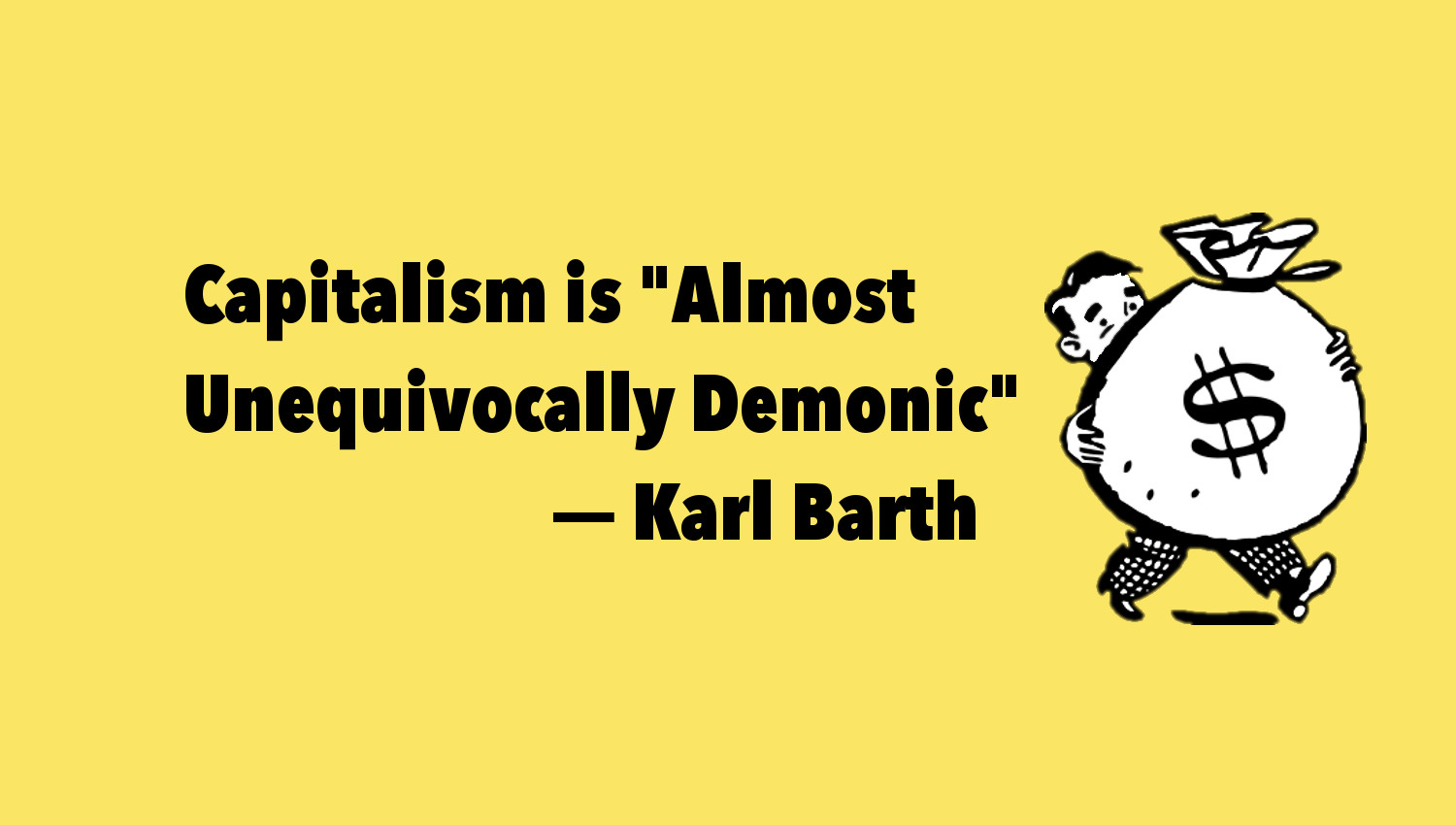 In the second edition of Karl Barth and Radical Politics (2017), Dr. George Hunsinger provided a helpful summary of Barth's severe criticisms of capitalism, and in one quote, Barth calls capitalism "almost unequivocally demonic." In CD III/2, Karl Barth said true humanity is "Jesus, a man for other men" (CD III/2), and in the following quotations, Barth explains that the capitalistic person, is one who lusts for themselves, and a capitalistic system establishes a small group of capitalistic people (i.e. the 1%) in a position of oppressive self-seeking power, that debases culture, and removes the dignity of the other 99%.
In the second edition of Karl Barth and Radical Politics (2017), Dr. George Hunsinger provided a helpful summary of Barth's severe criticisms of capitalism, and in one quote, Barth calls capitalism "almost unequivocally demonic." In CD III/2, Karl Barth said true humanity is "Jesus, a man for other men" (CD III/2), and in the following quotations, Barth explains that the capitalistic person, is one who lusts for themselves, and a capitalistic system establishes a small group of capitalistic people (i.e. the 1%) in a position of oppressive self-seeking power, that debases culture, and removes the dignity of the other 99%.
George Hunsinger summarizes Karl Barth as follows, "Capitalism, Barth argued, exacerbated some of the worst propensities of human nature. It fostered a revolution of empty and inordinate desires. It promoted 'lust for a superabundance,' 'lust for possessions,' and 'lust for an artificially extended area of power over [human beings] and things.' It generated enormous disparities in wealth and power, thus concentrating on life-and-death decisions 'in the hands of relatively few, who pull all the strings . . . in a way wholly outside the control of the vast majority.' A system that heightened self-seeking, debased culture, and, not least, obscured its own injustices, it was 'almost unequivocally demonic.' In these and other ways, it violated the dignity of human work. Work that possessed human dignity, Barth observed, would look very different." [1]
In the first quotation, Barth explains his disapproval of capitalism, and in the following summary of quotations (edited by Hunsinger), Barth explains that capitalism is also a self-deception. Capitalism places all the resources in the hands of the 1% and simultaneously deceives the 99%, by leading them to falsely belief that capitalism is for their own good. Capitalism, leads its denizens to believe they will be rewarded for their work, when in reality the majority of their labors are ultimately handed over to the 1%. Barth describes capitalism as a "great self-deception", which is fascinating, because many American Evangelicals deeply admire capitalism, so Barth's comment suggests that these Christians believe they are benefited by a system that ultimately harms them.
George Hunsinger summarizes Karl Barth as follows, "The Christian community, Barth urged, must not allow itself to 'participate in the great self-deception' of capitalism. It must not regard its supposed benefits, necessity, or even legitimacy as something that conforms to what is commanded by God. It must not accept the proposition, for example, that although the wealth under capitalism is inequitably distributed, each person's income reflects how hard or how valuably that person has worked. For 'the only choice which employees often have is between starvation and doing work which either does not benefit the cause of [humanity], is detrimental to it, or is completely, alien[ated], being performed in the service of a sinister and heartless and perpetually ambiguous idol'—namely mammon in the guise of 'capital.' Because capitalism forced people to work for 'meaningless ends and therefore dishonestly,' Barth wondered whether it was not almost inevitable that communism would triumph over it. '[I]s it not almost inevitable,' he asked during the Cold War, 'that the Marxist tyranny should finally overwhelm us, with its new and very different injustices and calamities, to teach us mores, true ethics, in this respect?' If we were to substitute the term 'Islamist' for the term 'Marxist' in this quotation, Barth's concerns might be even more relevant today.'" [xvi]
Hunsinger's final comparison of Marxism to Islam was an eye-opener. Perhaps, our capitalistic system justifies itself through fear of its most viable competitors? Or through fear of anything other in order to perpetuate its demonic power. The PostBarthian is based in Seattle, in a country with a capitalistic economy, so I believe Karl Barth's hard word against capitalism, is an important message for us, and anyone who lives under a capitalistic economy.
Sources:
1. George Hunsinger, Karl Barth and Radical Politics (Second Edition), Eugene: Cascade Books. 2007. p. xv
2. Ibid. xvi.
Header Image: money bag icon, source: wikipedia
Related: Capitalism, George Hunsinger, Karl Barth



November 7th, 2017 - 14:45
Thank you! Fits perfectly with David Bentley Hart’s essay on early Christian “communism” (he deliberately used the word) in last Sunday’s New York Times: https://www.nytimes.com/2017/11/04/opinion/sunday/christianity-communism.html.
November 7th, 2017 - 16:10
Thanks Andy! I’m happy you enjoyed the post. And I’m a fan of DBH! -Wyatt
November 7th, 2017 - 19:35
Amen!
November 12th, 2017 - 09:57
Excellent and thought provoking. Capitalism seems almost inextricable from American evangelical Christianity.
BTW, you could lose some of the commas…
“Perhaps our capitalistic system justifies itself through fear of its most viable competitors? Or through fear of anything other in order to perpetuate its demonic power. The PostBarthian is based in Seattle, in a country with a capitalistic economy, so I believe Karl Barth’s hard word against capitalism is an important message for us and anyone who lives under a capitalistic economy.” – https://owl.english.purdue.edu/owl/resource/598/01/